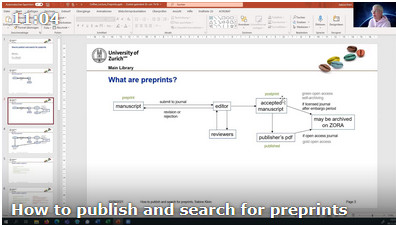This post is also available in:
 Deutsch
Deutsch

Preprints are publicly shared versions of manuscripts before peer review. They have gained new importance during the present pandemic, where fast dissemination of research results is wanted. Further benefits of publishing preprints are: setting a time stamp (when the question arises who discovered a result first), gaining visibility (due to open access of preprints), receiving feedback through comments or emails, and possibly getting increased Altmetric scores and citations for the final published paper [1].
On the other hand, publishing a preprint means additional work for the researchers. Not all journals allow preprint publications, so the policies of the journals should be checked [2]. It is also not always clear, if preprints may be cited e.g. in project proposals or job applications. Preprint servers are often subject-specific, thus, a server relevant to the researchers’ target audience should be chosen. A list of preprint servers can be found here [3].
Searching for preprints is not as simple yet as searching for journal publications. Only some preprints are covered by traditional databases (e.g. in Scopus author profiles or SARS-CoV-2 related preprints in PubMed). At this time, separate relevant servers or platforms (e.g. OSF Preprints) have to be searched.
References
1 Serghiou S, Ioannidis JPA. Altmetric Scores, Citations, and Publication of Studies Posted as Preprints. JAMA. 2018;319(4):402–404. doi:10.1001/jama.2017.21168
2 Brock J. 10 tips for submitting a successful preprint. How to stand out in the fast-growing throng. Online: https://www.natureindex.com/news-blog/tips-how-to-most-successful-preprint-research-science-submission-study
3 ASAPbio. List of preprint servers: policies and practices across platforms. Online: https://asapbio.org/preprint-servers

